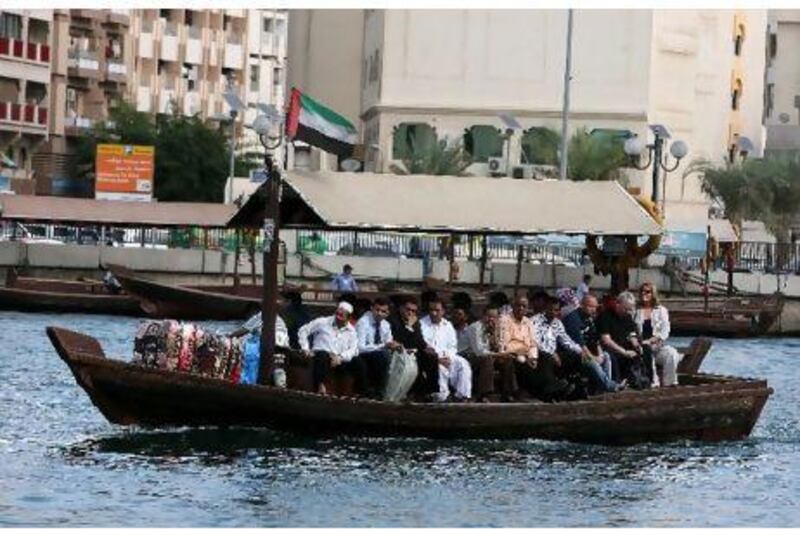UBAI // Shahbaz Hussain crosses the Creek for the fifth time since starting out, using a rudimentary wooden rudder to guide his chugging single-engine abra into a berth near Bur Dubai's Old Souk.
He calculates that he will be required to make 16 trips across the narrow stretch of water by day's end, ferrying up to 320 commuters. Abras have plied the turquoise waters of the Creek for more than 50 years, in increasing numbers starting around 1980, when merchants began to migrate from the "old town" in Deira to Bur Dubai.
Two modern bridges and a tunnel have been introduced since then, but Mr Hussain says there are no shortage of passengers.
"The majority of people don't drive because the bridges are too far," said the 35-year-old from Pakistan. "An abra ride is cheaper and takes about 20 minutes less time."
For those who live near the station in Bur Dubai, and work on the opposite side of the Creek, the abras are a lifeline. "I've been taking them every day for the last 10 years," said Shreeram Agrawal, a 39-year-old garment shop manager from India, who had just crossed to the Deira side.
"I live 500 metres from the Bur Dubai station and work 500 metres from here. I have a car, but I never use it."
On a weekday, as many as 80 per cent of people use the abras for commuting to and from work, according to a recent government-sponsored study by UAE University.
The abras are rough diamonds compared to the more polished waterbuses, which berth nearby. The study of 500 passengers found that 75 per cent of abra users were low-income blue-collar workers, while 79 per cent of waterbus customers were professionals or postgraduate educated.
A waterbus ticket costs Dh4, while an abra ride is just Dh1 and there are no paper tickets. Fares are collected by the driver before the journey starts.
Ten passengers sit on one side of the boat, 10 on the other. If a driver miscounts and has even one more person on board, he can face penalties of Dh210, according to Mr Hussain.
The majority of the 149 abras running on the Creek are owned by local partners, who then either rent them to operators, or employ drivers directly.
Mr Hussain is paid Dh1,000 by a local owner and is expected to work from 5am to 11pm, six days a week. One day off is allowed, he said, but not Friday - the busiest day for abra drivers.
"I like this work, but the salary is quite low," said Mr Hussain, who is a father of three. "It can be hard work too, especially in the summer."
Others hire a vessel and work on a freelance basis. Mohammed Islam Muneer Zaman, 23, from Bangladesh, is employed by his father - who in turn rents the abra from a local owner for Dh1,000 a month.
They typically make enough to save Dh2,500 a month. However, profits are often eaten into by the need to service the vessel every four months, to clear off the barnacles that accumulate on the underside.
Such maintenance repairs can often cost Dh3,000 to Dh4,000, he said.
Mr Zaman lives in Ajman in a villa with his immediate family of six, but says the drive to work at 4am is quick because there is so little traffic on the road.
He works every other day and rotates with another abra driver, who earns a comparable salary. He was born in the Emirates and has not once been to his father's homeland of Bangladesh.
"My home is here now," he said. "By the sea."






